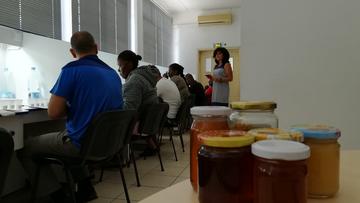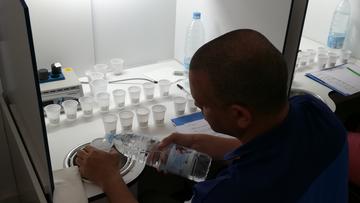Training beekeepers to assess the quality of their honey through sensory analysis
This training course was aimed at
- improving the knowledge through the perception and the olfactory and gustatory identification of the different beehive products (resulting from local productions in the Indian Ocean and international productions) ;
- transferring the sensory tools necessary for the detection of adulterated honey and to be able to characterize the specific defects of this type of adulteration ;
- identifying the different beehive products likely to be developed in Rodrigues (fresh pollen, dry, royal jelly, propolis...).
Priscilla Speville participated in the training and gained new knowledge: "This training has allowed us to discover other types of honeys that we do not know in Rodrigues and other qualities of honey too. Through sensory analysis, we have detected new flavors in honey, such as yellow fruits and other flowers. It gave us ideas to diversify the taste of our honey.”
"I am happy to have discovered other interesting products of the hive such as propolis, pollen, royal jelly" says Georges Eric Jolicoeur, beekeeper and president of the honey producer’s cooperative "Le Solitaire". “To determine the quality of a good honey, you have to find the taste of propolis and pollen. It allows us to distinguish a good honey from an adulterated one."
As a matter of fact, the increasing presence of adulterated honeys in the Indian Ocean is a real problem. These fraudulent honeys, with added sweet syrups, are difficult to detect by analysis. Hence the importance of training beekeepers in the detection of such adulterated honey. "Behind the issue of adulterated honeys, there is the image of our Rodriguan honey that is very typical and highly appreciated by tourists. If tourists buy fraudulent honey in Rodrigues, this may negatively impact the image of our honey and of our island ", worries George Eric.
This workshop follows a first training session held in Rodrigues in April 2016 aimed at creating a Rodriguan sensory panel comprised of honey producers and staff members of the Rodriguan Agriculture Commission. "We want to continue the work started with CIRAD and to train other beekeepers in Rodrigues to enlarge the panel and preserve the quality of our honey », adds Priscilla.
This training, conducted in partnership with the Rodrigues Committee on Agriculture and Cirad - UMR Qualisud, is part of the INTERREG-V Qualinnov project, co-funded by the European Union and the Region of Réunion.


